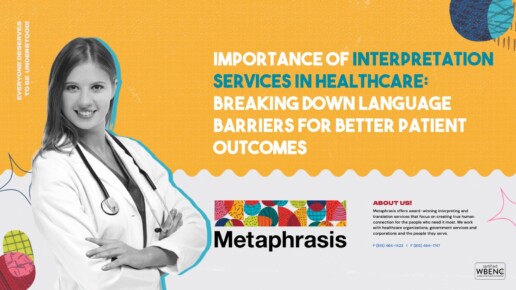Importance of Interpretation Services in Healthcare: Breaking Down Language Barriers for Better Patient Outcomes
Introduction
Effective communication is the cornerstone of quality healthcare. However, language barriers pose significant challenges for both patients and healthcare providers, leading to potential misunderstandings, misdiagnoses, and inadequate treatment plans. Interpretation services play a crucial role in bridging this gap, ensuring that all patients receive the care we need regardless of their language proficiency.
In a diverse world where healthcare settings are filled with patients speaking various languages, the importance of interpretation services cannot be overstated. Whether through professional interpreters or technology-assisted solutions, these services enhance patient experiences and contribute to better healthcare outcomes.
Understanding Interpretation Services in Healthcare
Interpretation services in healthcare refer to the process of translating spoken or signed communication between healthcare providers and patients who speak different languages. There are several types of interpretation services available:
- On-Site Interpretation: A professional interpreter is physically present during the consultation, ensuring immediate and accurate communication.
- Over-the-Phone Interpretation (OPI): Patients and providers connect with an interpreter via phone for real-time assistance.
- Video Remote Interpretation (VRI): A combination of visual and auditory communication using video conferencing technology.
Each method has its benefits and is chosen based on factors such as patient preferences, urgency, and resource availability.
The Impact of Language Barriers on Patient Care
Language barriers can have a profound impact on patient outcomes, contributing to various healthcare challenges such as:
- Miscommunication and Medical Errors: Patients may misunderstand medication instructions, leading to adverse health effects.
- Patient Dissatisfaction and Non-Compliance: A lack of understanding can result in frustration and reluctance to follow treatment plans.
- Delayed Treatment and Increased Costs: Without proper communication, diagnoses can be delayed, leading to worsening health conditions and higher medical expenses.
Key Benefits of Interpretation Services
Investing in interpretation services offers numerous advantages for both patients and healthcare providers, including:
- Improved Patient Understanding and Compliance: Patients are better informed about their conditions and treatment options.
- Enhanced Patient-Provider Relationships: Effective communication fosters trust and improves patient satisfaction.
- Reduction in Health Disparities: Ensuring language access helps eliminate inequalities in healthcare delivery.
Types of Interpretation Services Available
Healthcare institutions have several options for interpretation services, including:
- Professional Human Interpreters: Trained experts who understand medical terminology and cultural nuances.
- Bilingual Healthcare Staff: Staff members who speak multiple languages, offering immediate assistance.
- Technology-Driven Solutions: AI-powered translation apps and telehealth platforms providing real-time language support.
The Role of Certified Medical Interpreters
Certified medical interpreters play a vital role in delivering accurate and culturally sensitive communication. Metaphrasis undergo specialized training and certification processes to ensure:
- Proficiency in medical terminology and ethics
- Confidentiality and adherence to privacy regulations
- Cultural competence to address patients’ unique needs
Challenges in Providing Interpretation Services
Despite their importance, healthcare organizations face several challenges in implementing interpretation services, including:
- Cost Implications: Providing high-quality interpretation can be expensive for healthcare facilities.
- Shortage of Qualified Interpreters: A limited number of trained professionals can hinder timely access to services.
- Technological Limitations: Some patients, especially the elderly, may struggle with using digital interpretation tools.
Implementing Effective Interpretation Strategies in Healthcare
To overcome these challenges, healthcare providers can adopt the following strategies:
- Training Healthcare Professionals: Educating staff on working effectively with interpreters and culturally diverse patients.
- Investing in Interpretation Technology: Implementing reliable language access solutions.
- Policy Development: Establishing language access policies to ensure compliance with regulatory standards.
Case Studies: Success Stories of Interpretation Services
Many healthcare facilities have successfully integrated interpretation services, leading to:
- Improved patient satisfaction scores
- Reduced hospital readmissions due to better patient education
- Enhanced efficiency in emergency room operations
The Future of Interpretation Services in Healthcare
Advancements in technology continue to revolutionize language interpretation in healthcare. The future holds promising innovations such as:
- AI and Machine Learning: Predictive language models enhancing interpretation accuracy.
- Telemedicine Integration: Seamless access to interpretation during virtual consultations.
- Wearable Translation Devices: Instant, on-the-go communication for patients and providers.
Conclusion
Interpretation services are a critical component of patient-centered healthcare, breaking down language barriers and ensuring equal access to quality medical care. By investing in these services, healthcare providers can foster inclusivity, improve patient experiences, and ultimately achieve better health outcomes.

